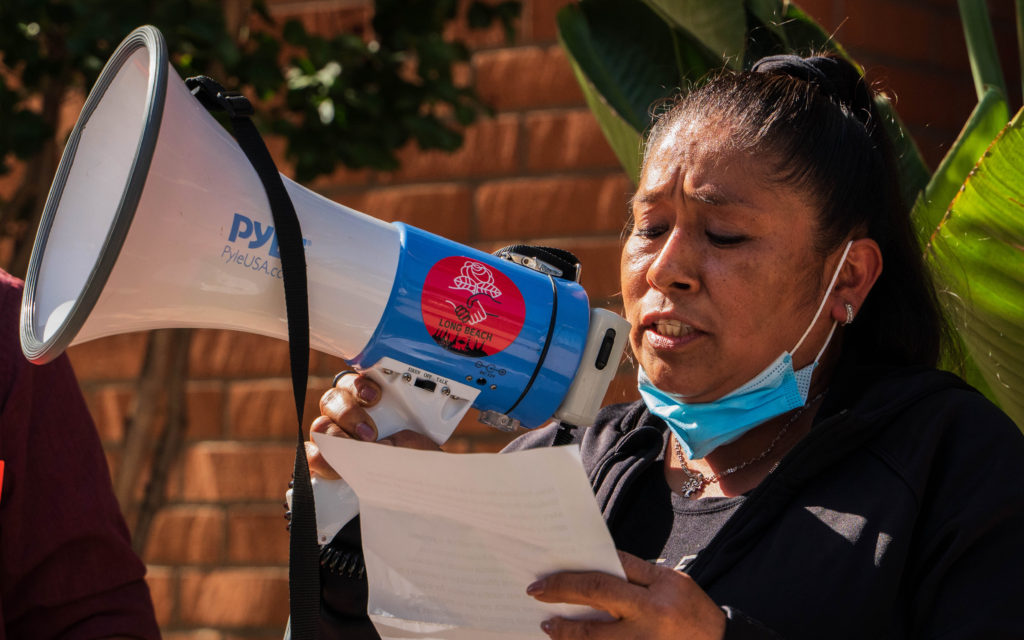After Months of Organizing by Tenants, City Council Set to Vote on Temporarily Banning Evictions for Substantial Remodeling
7 minute readThe threat of eviction is not new to the tenants of 436 Daisy Ave.
Multiple tenants living in the downtown apartment building united last year to fight for their homes, advocating for an anti-tenant harassment ordinance that the City Council passed last October. But their struggle didn’t end there.
For months, these tenants and others throughout Long Beach have worked with Long Beach Residents Empowered (LiBRE) and the Long Beach Tenants Union to advocate for the City Council to “close the loophole.”
The loophole their calls-to-action refer to is the portion of the state’s 2019 Tenant Protection Act that allows landlords to cite substantial remodeling of a unit as a reason to seek an eviction.
Now, the City Council will consider whether to draft an emergency ordinance to temporarily ban evictions due to substantial rehabilitation at Tuesday’s meeting.
Tenants and housing advocates have claimed that landlords in Long Beach have used this provision in the state law to displace tenants from their homes, which then allows the property owner to remodel the unit and raise the rent for new tenants.
Despite local, county, and statewide eviction moratoriums, data compiled by the Anti-Eviction Mapping Project shows that at least 7,400 eviction filings have occurred throughout Los Angeles County since stay-at-home orders began in late March 2020. The data does not specify how many are due to substantial remodeling, however, tenant advocates like Andrew Mandujano of the Long Beach Tenants Union have said he and other organizers know as many as 100 local families facing evictions due to substantial remodeling.
Tenant advocates have warned that when the state eviction moratorium is lifted at the end of September, there will be a wave of evictions and the substantial rehabilitation provision could make the wave into a tsunami.
According to documents and interviews, the tenants at the Daisy Avenue building received notices to vacate in October 2020 and unlawful detainers in January. The notices to vacate cited substantial remodeling as the reason for the evictions.
Under the Tenant Protection Act, extensive work on a unit’s structural, electrical, plumbing, or mechanical systems, or hazardous materials, are considered substantial remodeling. Cosmetic repairs that can be done without needing to vacate the property—such as painting or decorating—are not considered substantial rehabilitation.
A 60-day notice to vacate the unit served to one of the Daisy Avenue tenants by landlord Bradley Johnson outlines some of the work for which he’s attempted to terminate their tenancy.
Johnson states in the eviction notice the remodeling work will result in torn up flooring, utilities being disconnected, and no access to the bathroom or kitchen for the seven to eight weeks the work is expected to take.
“Most permits we’ve seen are for cosmetic renovations, such as cabinet replacements,” Mandujano said. “This work can be done safely with tenants in the unit and [doesn’t] constitute the need for forced displacement.”
Tomisin Oluwole
Face the Music, 2022
Acrylic on canvas
24 x 36 inches
Click here to check out our interview with Tomisin Oluwole, a literary and visual artist based in Long Beach.

Instead of gunking up our site with ads, we use this space to display and promote the work of local artists.
He believes the work Johnson wants to do on the Daisy Avenue building is cosmetic and there’s no reason to kick tenants out.
Silvia De La Rosa, a tenant who received a notice to vacate, said she has continued to pay rent throughout the pandemic and worries about finding a new place to live.
“Now, in full pandemic, what are we going to do? Go onto the street with our kids? I got my eviction notice while sick with COVID,” De La Rosa said in Spanish, “They tell us to stay in our homes but how can we if the owner wants us out?”

Another Daisy tenant, Dominga Santiago, said she is willing to pay an increased rent in exchange for repairs, but notes that it should be in accordance with the Tenant Protection Act. She worries about finding a new place to live due to how expensive it is. She’s lived in the area for the past 10 years, and says it is the only home her daughters know.
“They don’t want to leave here,” Santiago said in Spanish. “Their school is nearby, their friends are, and my work is nearby too. They think, ‘where will we go now?’ Because we could find somewhere to go, but it might be far from here.”
It’s because of their concerns and desire to stay home that these tenants and many others have rallied throughout the city and called into City Council meetings for months. Councilmembers Suely Saro and Cindy Allen introduced the proposal that will be considered on Tuesday to close the loophole.
“Our proposal is grounded in the concept of basic fairness and ensures our landlords and tenants have a clear path forward with respect to renovation projects. What’s happening right now isn’t working. Families are at risk of losing their homes,” Allen wrote in an email blast sent last week.
If passed, the measure would accomplish two goals of tenant advocates: enact a temporary moratorium on evictions due to substantial remodeling of a unit and launch a study into establishing a renovation administration program. Though some Long Beach tenants may be eligible for protection from displacement by recently passed county and state eviction moratoriums, this policy could indefinitely protect them from evictions brought forth by the desire to substantially rehabilitate a residential unit.
Renovations would need approval from the program before permits would be issued or construction could begin. The item also proposes that as part of the renovation administration program landlords would be prohibited from raising the rent on tenants returning to a renovated unit until six months after the completion of the work. After that, rent increases following the limits of the Tenant Protection Act would be allowed.
Locally, substantial remodels would be removed as a just cause for eviction after the establishment of the renovation administration program.
“While the policy isn’t a complete loophole closure it is a huge step in the right direction,” Mandujano said. “Tenants in Long Beach can rest assured that once a renovation administration program is established, they’ll be able to experience honest repairs without the fear of displacement or an illegal rent increase.”
Members of the public will be able to attend and speak in-person at the July 6 City Council meeting at Long Beach City Hall. To submit an e-comment on any item, visit the Speakup Long Beach website.


 comar@yli.org
comar@yli.org @carlosbromar
@carlosbromar




